Fleurs du Mal Magazine


Or see the index

Oxford
At home as in no other city, here
summer holds her breath in a dark street
the trees nocturnally scented, lovers like moths
go by silently on the footpaths
and spirits of the young wait,
cannot be expelled, multiply each year.
In the meadows, walks, over the walls
the sunlight, far-travelled, tired and content,
warms the recollections of old men, touching
the hand of the scholar on his book, marching
through quadrangles and arches, at last spent
it leans through the stained windows and falls.
This then is the city of young men, of beginning,
ideas, trials, pardonable follies,
the lightness, seriousness and sorrow of youth.
And the city of the old, looking for truth,
browsing for years, the mind’s seven bellies
filled, become legendary figures, seeming
stones of the city, her venerable towers;
dignified, clothed by erudition and time.
For them it is not a city but an existence;
outside which everything is a pretence:
within, the leisurely immortals dream,
venerated and spared by the ominous hours.
Keith Douglas
(1920 – 1944)
Oxford
• fleursdumal.nl magazine
More in: # Classic Poetry Archive, Archive C-D, Archive C-D, Douglas, Keith, WAR & PEACE

Desert Flowers
Living in a wide landscape are the flowers –
Rosenberg I only repeat what you were saying –
the shell and the hawk every hour
are slaying men and jerboas, slaying
the mind: but the body can fill
the hungry flowers and the dogs who cry words
at nights, the most hostile things of all.
But that is not new. Each time the night discards
draperies on the eyes and leaves the mind awake
I look each side of the door of sleep
for the little coin it will take
to buy the secret I shall not keep.
I see men as trees suffering
or confound the detail and the horizon.
Lay the coin on my tongue and I will sing
of what the others never set eyes on.
Keith Douglas
(1920 – 1944)
Desert Flowers
• fleursdumal.nl magazine
More in: Archive C-D, Archive C-D, Douglas, Keith, WAR & PEACE
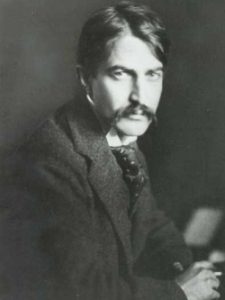
Behold, the grave of a wicked man
Behold, the grave of a wicked man,
And near it, a stern spirit.
There came a drooping maid with violets,
But the spirit grasped her arm.
“No flowers for him,” he said.
The maid wept:
“Ah, I loved him.”
But the spirit, grim and frowning:
“No flowers for him.”
Now, this is it —
If the spirit was just,
Why did the maid weep?
Stephen Crane
(1871 – 1900)
Behold, the grave of a wicked man
• fleursdumal.nl magazine
More in: *War Poetry Archive, Archive C-D, Archive C-D, Stephen Crane

Letzte Lieder
–––––––––––––
Und leise, traumhaft wieder
Die Harfe mir erklang,
Es sind die letzten Lieder,
Die ich hienieden sang.
Es ist von meinem Herzen
Gelöst der letzte Hauch
––––––––––––––
––––––––––––––
Alfred Teniers.
1.
Schwarz und still in meinem Hirn,
Schwarz und still in meiner Stube,
Nur der Pendel meiner Uhr
Hüpfet wie ein munt’rer Bube.
Plötzlich zuckt auf Deinem Bild,
Farblos, wie auf einem Grabe –
Ein verirrter Mondenstrahl,
Mahnt, daß ich noch Thränen habe.
2.
Ist es Friede, ist es Glück,
Was durch meine Träume zieht,
Unsichtbar, wie Blumenduft,
Leise, wie ein Kindeslied?
Kehrt die Jugend mir zurück,
Jene Sehnsucht, die mich mied,
Seit des Lebens kalte Luft
Mich und meine Seele schied?
3.
Durch die dicht verhängten Fenster
Dringt das dumpfe Wagenrollen,
Und verscheucht die Nachtgespenster,
Die im Traum mir nahen wollen.
Aber rauschend durch mein Zimmer
Wogt ein Meer von wirren Tönen,
Und aus all’ dem Schmerzgewimmer
Hör’ ich meine Seele stöhnen!
Hör’ ich meine Seele weinen –
Nicht um dieses Leibes Sterben –
Doch es bangt ihr vor dem kleinen,
Müden, einsamen Verderben.
4.
Über meinem Lager hängt,
Welk, bestaubt und abgestorben,
Ein beflorter Lorbeerkranz
Neben Myrthen, längst verdorben.
Und in meinem Fiebertraum
Schaute ich sie wieder blühen –
Und mich selber jugendfreudig
Unter ihrem Duft erglühen.
Aber ach, das Fieber schwand.
Welk, so wie mein eig’nes Leben,
Schaue ich die Kränze dort
Nur an dünnen Fäden schweben.
5.
Der alte Kampf ist ausgekämpft;
Weit hinter mir liegt jede Qual,
70Es fiel in meines Lebens Frost
Der erste warme Sonnenstrahl.
Weit hinter mir liegt Groll und Leid
Durch milde Thränen aufgethaut.
Mein Auge hat zum ersten Mal
Die Wahrheit und das Glück geschaut.
6.
Leg’ auf mein Haupt, so fieberheiß,
Die kühle weiche Hand,
Mein brennend Antlitz wende leis’
Und sachte hin zur Wand;
Es ist so schwer mein Augenlied
Daß ich’s nicht heben kann,
Und meine Lippe dürr’ und müd’
O schaue mich nicht an! –
Wend’ sachte mein Gesicht zur Wand;
Kann ich Dich auch nicht seh’n,
Fühl’ ich doch Deine weiche Hand
Und Deines Athem’s Weh’n.
7.
Rasch durch das dunkle Zimmer huscht
Mein Vogel, traurig singend,
Er will hinaus in’s Sonnenlicht,
Er zwitschert schüchtern-dringend.
Flieg’ in die kalte fremde Welt,
Flieg’ über Thal und Hügel,
Du kleiner Vogel, hast ja heut’
Noch ungebroch’ne Flügel. –
8.
Es pfeift der Wind sein frostig Lied,
Und eiserstarrte Tropfen
Wirft klirrend an die Scheiben er,
Die Kranken wach zu klopfen.
Die alte Frau an meinem Bett
Nickt müd’, in Schlaf versunken,
Die Kohlen im Kamine sprüh’n
Bei jedem Windstoß Funken.
Aufhorchend knurrt der kleine Hund,
Um ächzend fortzuträumen,
Das Lampenlicht spielt flackernd roth
Mit der Tapete Bäumen.
Der nackten Göttin weißes Bild
Lacht höhnisch auf mich nieder.
Es pfeift der Wind – Gedanken zieh’n. –
Ich find’ den Schlaf nicht wieder.
9.
Leg’ Du mich in den Sarg hinein,
Schließ Du den Deckel zu,
Und hinter meinem Sarg allein,
Geh’ Du – Niemand als Du.
Den ich geliebt, und Leid’s gethan
Warst Du – nur Du allein….
Komm’ nie zu meinem Grabe Mann,
Ich will vergessen sein.
Ada Christen
(1839 – 1901)
Letzte Lieder
1870
• fleursdumal.nl magazine
More in: # Classic Poetry Archive, Archive C-D, Archive C-D, Christen, Ada
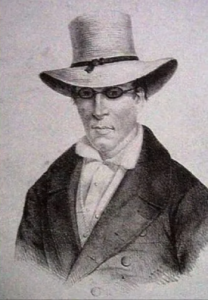
Le Mutilé
Vingt ans et mutilé !… voilà quelle est ma part;
Vingt ans… c’est l’âge où Dieu nous fait un cœur de flamme;
C’est l’âge où notre ciel s’embellit d’un regard,
L’âge où mourir n’est rien pour un baiser de femme.
Et le sort m’a tout pris !… excepté mon cœur!
Mon cœur… à quoi sert-il ? ironique faveur!
C’est le feu qui révèle au nautonier qui sombre,
Le gouffre inévitable au sein de la nuit sombre;
C’est la froide raison rendue à l’insensé:
Heureux s’il n’eût jamais pensé!
Mais ton amour est là, mon ange tutélaire,
Et mon cœur souffre moins, lorsque je dis: ma mère!
A ce large festin des élus d’ici-bas,
Qui me dira pourquoi je ne suis qu’un Lazare!
La vie est une fête où je ne m’assieds pas,
Et pourtant j’ai rêvé sa joyeuse fanfare!
La douleur m’a fait boire à sa coupe de fer;
Jeune vieillard, j’ai bu tout ce qu’elle a d’amer.
O vous qui demandez si l’âme est immortelle,
Et ma part de bonheur,… dites!… où donc est-elle?
Quoi ! Dieu nous mentirait, quand sa sainte équité
Nous promet l’immortalité!
Mais ton amour est là, mon ange tutélaire,
Et je ne puis douter, lorsque je dis: ma mère!
Toute existence ici s’échange par moitié,
Chaque âme peut trouver cette âme de son rêve;
Moi, quand je crie : Amour, l’écho répond : Pitié !…
Et ce mot dans mon cœur s’enfonce comme un glaive
Quelle bouche de femme éteindra dans mon sein
Cette soif d’être aimé qui me brûle sans fin?
Vivre seul dans la vie… Oh ! ce penser me tue!
Vivre seul… quand mon cœur est si riche d’amour.
Il vibre comme un glas dans mon âme abattue;
C’est à ne plus aimer le jour!
Mais ton amour est là, mon ange tutélaire,
Et je veux vivre encor, lorsque je dis: ma mère!
Souvent, le front ridé de mes sombres ennuis,
J’ai voulu, dans la foule, être oublieux et vivre;
J’ai voulu respirer, au sein des folles nuits,
Ces voluptés de bal dont le prestige enivre;
Imprudent que j’étais!… j’ai maudit leurs plaisirs!
Car je voyais glisser, dans leur valse en délire,
Ces vierges que le ciel enfanta d’un sourire;
Je les voyais; et nulle, en passant près de moi,
Ne disait d’un regard : à toi!
Mais ton amour est là, mon ange tutélaire,
Et je ne maudis plus, lorsque je dis: ma mère
Oh ! vous ne savez pas, vous qui vivez heureux,
Ce qu’un long désespoir peut jeter dans la vie!
Vous n’avez point senti ce moxa douloureux
Qui torture le cœur et qu’on nomme l’envie!
Quand un rêve d’amour vous suit au bal bruyant,
L’espérance du moins s’y montre en souriant;
Mais moi, lorsque le bal a fini ses quadrilles,
Ai-je une fiancée, entre ces jeunes filles,
A qui je puisse dire en lui serrant la main:
Dieu m’a fait un bien doux destin!
Mais ton amour est là, mon ange tutélaire,
Et puis-je être envieux, lorsque je dis : ma mère!
Ah ! lorsque vers la tombe inclinera mon front,
Je n’aurai pas une âme à qui léguer mon âme;
Arrivé seul au port où m’attend l’abandon,
Sans sourire, sans pleurs, je quitterai la rame.
Aucun enfant au seuil de mes jours éternels
Ne viendra recevoir mes adieux paternels!
Autour de mon chevet, à l’heure d’agonie,
Mes regards vainement chercheront une amie!
Et de moi, sur ce globe où je vins pour souffrir,
Plus rien… pas même un souvenir!
Mais ton amour est là, mon ange tutélaire,
Et si tu me survis, tu pleureras…. ma mère!
Eugène Dayot
(1810-1852)
Le Mutilé
• fleursdumal.nl magazine
More in: Archive C-D, Archive C-D, Dayot, Eugène, Leprosy
Raymond Carvers wereldfaam berust op tweeënzeventig korte verhalen waarin zelden iets bijzonders gebeurt.
Carver beschrijft de gewone wederwaardigheden van gewone mensen in gewoon proza. Zijn grote talent is het naar boven brengen van het bijzondere, het beangstigende en het dramatische in al die gewoonheid.

In zijn eigen woorden: ‘Het is mogelijk om in een gedicht of verhaal over alledaagse dingen en voorwerpen te schrijven in alledaagse maar dan wel precieze taal en die dingen – een stoel, het gordijn voor een raam, een vork, een steen, de oorbel van een vrouw – een immense, zelfs aangrijpende lading mee te geven.’
De verhalen van Carver vormen het schoolvoorbeeld van het korte verhaal als een slice of life: er is weinig plot, weinig expliciete voorgeschiedenis; hoe het afloopt krijg je ook nooit te lezen, maar de kennismaking met een volstrekt authentiek, onbekend leven, dat in zijn beperktheid toch een volledig beeld geeft, brandt de lezer in de ziel.
Carver-vertaler Sjaak Commandeur selecteerde speciaal voor deze uitgave 200 pagina’s nooit eerder vertaald werk. Een kleine weldaad is de grootste verzameling van Carvers werk die ooit in Nederland verscheen, met onder veel meer de klassiekers Wees alsjeblieft stil, alsjeblieft, Waar we over praten als we over liefde praten en Kathedraal.
Raymond Carver (1938–1988) brak in 1976 door met de publicatie van zijn verhaal ‘Will You Please Be Quiet, Please?’ en de gelijknamige bundel. Later volgden de verhalenbundels What We Talk About When We Talk About Love (1981) en Cathedral (1983). Carver groeide op in een gezin uit de lagere middenklasse. De uitdagingen en moeilijkheden die hij in die sociale klasse observeerde, vormen een centraal thema in zijn gehele oeuvre, evenals zijn eigen worstelingen in zijn huwelijk en met een alcoholverslaving. Carver is een van de meest karakteristieke stemmen uit de twintigste-eeuwse Amerikaanse literatuur.
Auteur: Raymond Carver
Een kleine weldaad.
Alle Verhalen
Vertaler: Sjaak Commandeur
Taal: Nederlands
Releasedatum: 01 september 2023
Bindwijze: Gebonden
ISBN 9789028232075
812 pagina’s
Prijs: € 45,00
• fleursdumal.nl magazine
More in: - Book News, - Bookstores, Archive C-D, Archive C-D, Carver, Raymond
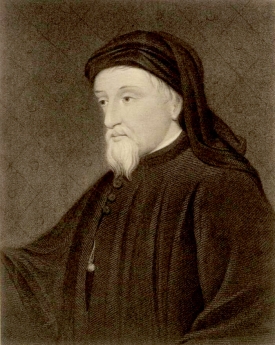
Since I From Love
Since I from Love escaped am so fat,
I ne’er think to be in his prison ta’en;
Since I am free, I count him not a bean.
He may answer, and saye this and that;
I do no force, I speak right as I mean;
Since I from Love escaped am so fat.
Love hath my name struck out of his slat,
And he is struck out of my bookes clean,
For ever more; there is none other mean;
Since I from Love escaped am so fat.
Geoffrey Chaucer
(1343 – 1400)
Since I From Love
• fleursdumal.nl magazine
More in: Archive C-D, Archive C-D, Geoffrey Chaucer

Salazie
Oh ! dis-moi donc, enfant de la race créole,
D’où vient que pour nos bords, ton cœur est sans amour?
D’où vient que faible encor, ta première parole,
Dans l’avenir douteux, semble arrêter le jour
D’un départ sans retour?
Pourquoi, lorsque ta mère, offrant ton brun visage
A la splendeur d’un ciel si poétique à voir,
Insoucieux de lui, ton oeil ardent et noir,
A l’horizon lointain, demande une autre plage,
Ton rêve et ton espoir?
France ! France ! voilà ce que ton âme crie:
Eh ! la France, dis-moi, vaut-elle ta patrie?
De ton brillant soleil le sien est-il rival?
Son ciel est-il plus pur, sa nature plus belle?
Lorsque l’hiver partout jette la faim cruelle,
Dans tes fertiles champs, le joyeux cardinal,
En vain, pour ses petits, va-t-il lasser son aile?
Non, non, jamais l’hiver, déroulant son linceul,
N’affligea nos climats de famine et de deuil;
De nos bois de palmiers la robe est éternelle;
Le tarin chaque année y retrouve son nid,
Et l’oranger, si cher aux amours de Parny,
A tous nos beaux soleils offrent une fleur nouvelle.
Mais, ingrat, le dédain te mord et brûle au front,
Viens, suis-moi, fuis ces lieux où l’Océan tranquille,
Caresse avec amour les grèves de notre île;
Vois-tu, bien loin, là-bas, ce gigantesque mont,
Dont le front chauve et gris en trois cônes s’effile?
De son humide sein, immense réservoir,
Trois rivières, trois sœurs s’échappent sans se voir,
Et le chasseur hardi, seul, debout sur ces cimes,
Voit serpenter leurs lits creusés dans les abîmes.
Salazie à ses pieds, comme un riant Eden,
Sommeille en attendant les beaux jours de juin.
C’est là que ma muse fidèle,
Fière de chanter en chemin,
T’invite à voler avec elle.
Sur le léger Maho consens à t’appuyer.
Laissons de Saint-André la ville pluvieuse ;
Quittons les vastes champs où la canne orgueilleuse,
Sans pitié détrôna le vieux giroflier;
Regarde de ce pont la légère structure;
Il s’élance, hardi, d’un bord à l’autre bord;
Et le frisson au cœur, le passant y mesure
L’espace qui, sous lui, semble un gouffre de mort.
Là, comme un éternel musée
Qui s’ouvre aux yeux du voyageur,
La nature déroule, imposante et bronzée,
De sa création la pompe et la grandeur!
Là, si ta veine émue est pleine encor de sève,
Si ton regard de nain peut voir et mesurer,
Si d’un sublime amour ton cœur peut s’enivrer,
Contemple, admire et rêve…
Mais d’un vol plus rapide, effleurons ces vallons,
Où, par endroit dans la clairière,
Une blanche fumée, ondulant en flocons,
Trahit du Salazien la tente hospitalière.
Saluons, en passant, ces superbes pitons
Qu’une vapeur bleuâtre offre à sa transparence.
La royale fougère y suspend ses festons,
Et sur leurs flancs moussus le palmier balance.
Contemplant ces torrents qui blanchissent leurs bords,
Et ces ponts suspendus, et ces gorges profondes,
Où l’on n’entend jamais que le long bruit des ondes
Qui tombent en cascades et grondent en accords!
Ne te semble-t-il pas dans ce chœur d’harmonies,
Ouir les grandes voix d’invisibles génies?
Mais poursuivons, sans bruit dans ces bois parfumés,
Où le vert framboisier défend ses fruits aimés;
Où le Natte géant jette une ombre suprême,
Où le Fanjan élance un coquet diadème;
Et tantôt dans la vallée, échappant à l’ombrage,
Arrivons sans fatigue à ces frais ermitage
Assis au bord de l’eau.
Vois s’ouvrir après lui ce cirque granitique,
Sublime enfantement d’un cataclysme antique,
Où telle qu’une fleur dans un casque d’airain,
Marzas sourit au pèlerin;
Laisse-la reposer dans l’ombre
Des citronniers groupés sans nombre,
Et contemple avec moi ce grand panorama,
Tout hérissé de pics à la face angulaire.
Oh ! quelle forte main, en ligne circulaire,
Les fondit et les rassembla!
Parlez, répondez-moi, vieux colosses de pierre:
Êtes-vous d’un volcan les travaux infinis,
Ou les noirs ossements de ces géants punis
Pour avoir, jusqu’aux cieux, porté leur tête altière?
D’un temple surhumain êtes-vous les débris,
Ou d’un monde inconnu les ébauches sublimes?
De la destruction les terribles esprits,
Vous ont-ils laissés là, comme les millésimes
D’un passé merveilleux par le néant surpris?
Il semble au voyageur qui, muet, vous admire,
Que debout sur vos fronts un Dieu passe et respire!
Oh ! que j’aime à vous voir lorsque Mars orageux
Vous a longtemps cachés sous ses brumes compactes,
Vous reparaissez tout frileux,
Et blancs de mille cataractes!
Mais je vois Bé-Massoum, Anchaing et Cimandefs,
Qui se dressent là-bas, semblables à trois chefs.
Faisons encore trois pas ; ah ! voilà Salazie,
La voilà sous nos yeux, fraîche de poésie!
Salut, Sainte oasis ! Toi, Piton, son époux,
Qui la gardes de loin comme un vieillard jaloux,
Salut à la blanche couronne,
Dont la nue au front t’environne!
Salut au moins, en cheveux blancs
Qui prie à genoux sur tes flancs!
Je te revois, source chérie,
Comme on revoit une patrie;
Car, pour celui qui souffre et gémit ici-bas,
La patrie est aux lieux où la douleur n’est pas!
Trois fois de ton versant j’ai vu le triple étage,
Peupler ses toits joyeux de frères et d’amis;
Car, là comme tes jours, le cœur est sans nuage,
Et l’égoïsme affreux ne fut jamais admis!
Sous ton beau ciel sans haine et sans envie,
La joie au cœur on vit d’une autre vie;
Et bien souvent ton orgueilleux rempart
Compta les pleurs répandus au départ!
Oh ! tu n’es plus ce bienfait inutile,
Au fond des bois, si longtemps rejeté!
Chaque saison voit un peuple débile,
Boire à tes eaux la force et la santé;
Oui, le bonheur te charme, ô ma jouvence!
Ton gai séjour s’éveille au bruit des jeux,
Et ta fontaine, au cœur du malheureux
Apporte au moins une douce espérance!
Ah ! puisses-tu comme un rayon de miel,
Toujours t’offrir à ceux qui, sur la terre,
Ne boivent plus qu’à la coupe de fiel!
Eugène Dayot
(1810-1852)
Salazie
• fleursdumal.nl magazine
More in: Archive C-D, Archive C-D, Dayot, Eugène, Leprosy
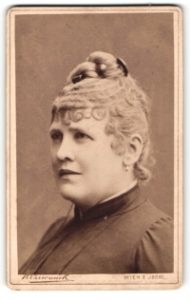
Asche
1.
Wie sie lodern, wie sie beben,
Still verglimmen und verweh’n –
Und ein Stück von meinem Leben
Seh’ in Asche ich vergeh’n.
Weiche, goldig-blonde Locken,
Manche Blume, die da schlief,
Es zerstirbt in Aschenflocken
Mancher alte Liebesbrief.
Welches Glück die Worte brachten,
Diese Phrasen, – Gott erbarm’!
Wie sie heiß den Kopf einst machten –
Heute wird die Hand kaum warm!
2.
Im Kamin lag grau die Asche,
Und ich saß, nachdenklich schürend,
In dem letzten tauben Reste
Nach verborg’nen Gluthen spürend.
Und es flammte aus der Asche,
Wieder helle Funken sprühend,
Eine halbverglomm’ne Kohle
Und zersplitterte verglühend.
Und es flüstert in der Asche:
Warum tödtest Du, berührend
Was noch aufflammt, Dir zur Leuchte,
Dich aus Nacht und Kälte führend? ….
3.
Wilde, ungeberd’ge Flammen,
Die sich suchen und verstecken,
Wie sie zischeln, wie sie schmeicheln
Und sich schlängeln und sich necken;
Wie sie prasseln, knistern, jubeln,
Sich verfolgen und umschlingen,
Wie sie zu dem heißen Reigen
Ihre lockern Lieder singen!
Wie sie endlich glühend züngeln,
Jauchzend hoch und höher schlagen,
Mit den schlanken rothen Armen
Gierig in einander ragen!
Welches glühend frische Leben
Seh’ ich in den Flammen treiben –
Und nichts als ein Häuflein Asche
Soll von all’ den Gluthen bleiben? ….
4.
Todte Liebe, – kalte Asche!
Armer, längst zerstob’ner Traum –
Wie ein geisterhaftes Mahnen
Weht es durch den öden Raum!
Oft ist mir, als müßt ich hüten
Dich, wie einst, mein sterbend Kind –
Doch ein Luftzug – und die Asche
Fliegt hinaus in Nacht und Wind!
Ada Christen
(1839 – 1901)
Asche
1870
• fleursdumal.nl magazine
More in: Archive C-D, Archive C-D, Christen, Ada

Moi (Le lépreux)
Quand les neiges de l’âge auront blanchi mon front,
Aurai-je une âme en qui s’épanchera mon âme?
Non, malheureux, au port où m’attend l’abandon,
sans joie et sans regret, je quitterai la rame!
Aucun enfant au seuil de mes jours éternels,
Ne viendra recevoir mes baisers paternels!
Sur ma couche, râlant, combattant l’agonie,
Mes regards vainement chercheront une amie!
Dans ce monde où tout naît, tout vit et doit mourir,
Que laisserai-je ? … Rien… pas même un souvenir!!
24 mars 1836
Eugène Dayot
(1810-1852)
Moi (Le lépreux)
• fleursdumal.nl magazine
More in: Archive C-D, Archive C-D, Dayot, Eugène, Leprosy
A specter, haunting the edges of society: because neoliberalism insists there are no social classes, thus, there is no working class, the main subject of Hotel Oblivion, a working class subject, does not exist.
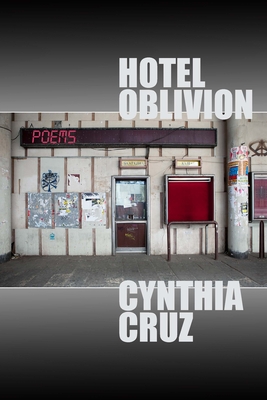 With no access to a past, she has no home, no history, no memory. And yet, despite all this, she will not assimilate. Instead, this book chronicles the subject’s repeated attempts at locating an exit from capitalist society via acts of negative freedom and through engagement with the death drive, whose aim is complete destruction in order to begin all over again.
With no access to a past, she has no home, no history, no memory. And yet, despite all this, she will not assimilate. Instead, this book chronicles the subject’s repeated attempts at locating an exit from capitalist society via acts of negative freedom and through engagement with the death drive, whose aim is complete destruction in order to begin all over again.
In the end, of course, the only true exit and only possibility for emancipation for the working class subject is through a return to one’s self. In Hotel Oblivion, through a series of fragments and interrelated poems, Cruz resists invisibilizing forces, undergoing numerous attempts at transfiguration in a concerted effort to escape her fate.
Cynthia Cruz is the author of six collections of poems: Guidebooks for the Dead (Four Way Books, 2020), Dregs (Four Way Books, 2018), How the End Begins (Four Way Books, 2016), Wunderkammer (Four Way Books, 2014), The Glimmering Room (Four Way Books, 2012) and Ruin (Alice James Books, 2006). Disquieting: Essays on Silence, a collection of critical essays exploring the concept of silence as a form of resistance, was published by Book*hug in the spring of 2019. The Melancholia of Class, an exploration of melancholia and the working class, was published by Repeater Books in July of 2021.
Cruz earned an MA in German Language and Literature from Rutgers University and is currently pursuing a PhD at the European Graduate School where her area of research is psychoanalysis and philosophy. Cruz teaches in the Graduate Writing Program at Columbia University and is a visiting writer in the MFA Writing Program at the University of Massachusetts, Amherst. She is also a mentor in the Low Residency MFA Writing Program at the Institute of American Indian Arts. Cruz co-edits the multi- disciplinary online journal, Schlag Magazine.
Hotel Oblivion
Author Cynthia Cruz
Publisher: Four Way Books
Publication Date 2022-02
Section Poetry
Language: English
ISBN: 9781954245112
ISBN-10: 1954245114
Format Paperback
Pages: 120
List Price $16.95
• fleursdumal.nl magazine
More in: #Editors Choice Archiv, - Book News, - Bookstores, Archive C-D, Archive C-D
Vintage Readers are a perfect introduction to some of the great modern writers: The celebrated bestselling author of The House on Mango Street “knows both that the heart can be broken and that it can rise and soar like a bird.
 Whatever story she chooses to tell, we should be listening for a long time to come” (The Washington Post Book World).
Whatever story she chooses to tell, we should be listening for a long time to come” (The Washington Post Book World).
A winner of the PEN/Nabokov Award for Achievement in International Literature and the prestigious MacArthur Fellowship, Sandra Cisneros evokes working-class Latino experience with an irresistible mix of realism and lyrical exuberance.
Vintage Cisneros features an excerpt from her bestselling novel The House on Mango Street, which has become a favorite in school classrooms across the country.
Also included are a chapter from her novel, Caramelo; a generous selection of poems from My Wicked Wicked Ways and Loose Woman; and seven stories from her award-winning collection Woman Hollering Creek.
SANDRA CISNEROS is a poet, short story writer, novelist and essayist whose work explores the lives of the working-class. Her numerous awards include NEA fellowships in both poetry and fiction, the Texas Medal of the Arts, a MacArthur Fellowship, several honorary doctorates and national and international book awards, including Chicago’s Fifth Star Award, the PEN Center USA Literary Award, and the National Medal of the Arts awarded to her by President Obama in 2016. Most recently, she received the Ford Foundation’s Art of Change Fellowship, was recognized among The Frederick Douglass 200, and was awarded the PEN/Nabokov Award for Achievement in International Literature.
Her classic, coming-of-age novel, The House on Mango Street, has sold over six million copies, has been translated into over twenty languages, and is required reading in elementary, high school, and universities across the nation.
In addition to her writing, Cisneros has fostered the careers of many aspiring and emerging writers through two non-profits she founded: the Macondo Foundation and the Alfredo Cisneros del Moral Foundation. She is also the organizer of Los MacArturos, Latino MacArthur fellows who are community activists. Her literary papers are preserved in Texas at the Wittliff Collections at Texas State University.
Sandra Cisneros is a dual citizen of the United States and Mexico and earns her living by her pen. She currently lives in San Miguel de Allende.
Vintage Readers
By Sandra Cisneros
Publisher: Vintage
Series: Vintage Readers
Language: English
2004
Pages: 208
ISBN: 9781400034055
ISBN-10: 1400034051
paperback
$12.95
• fleursdumal.nl magazine
More in: #Short Stories Archive, - Book News, - Bookstores, Archive C-D
Thank you for reading Fleurs du Mal - magazine for art & literature